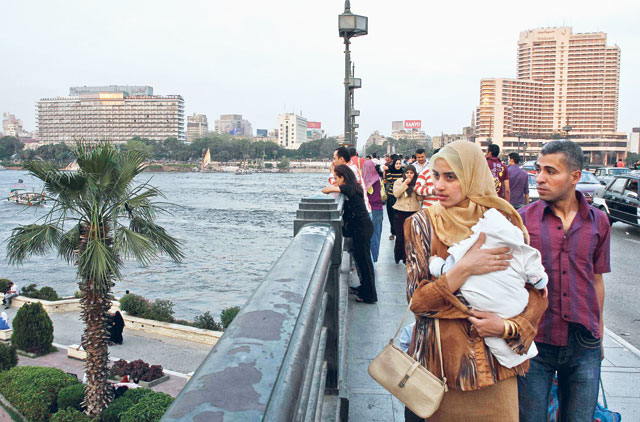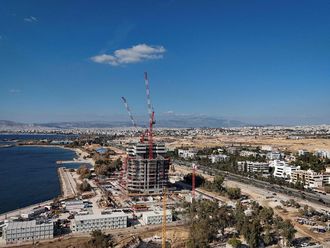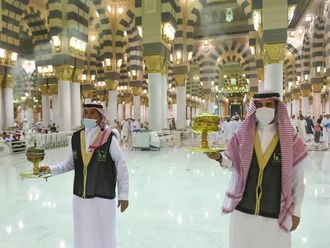
For almost 10,000 years, the Nile River never lost its charm and vitality to Egyptians. In the same way that their ancestors appreciated and worshipped the river, modern Egyptians still consider the Nile to be the fundamental pillar for sustaining life and existence in general.
In a desert region, where it rains only a couple of times a year, the longest river in the world presents a consistent source of water that helps sustain life by providing water for agriculture and drinking. Its also acts as the wellspring of one of the greatest civilisations in human history.
However, the fact that Egypt had long taken for granted — that the Nile will always flow through their lands — may now, more than ever, face a dramatic shift.
Five African countries have recently signed a treaty stating the equitable sharing of the waters of the Nile among all ten Nile-basin countries.
The Ugandan town of Entebbe witnessed a historic move when Ethiopia, Kenya, Uganda, Rwanda and Tanzania agreed on a new framework to share the Nile's waters more fairly, which will place them on a serious collision course with their northern neighbours Egypt and Sudan.
Optimistic outlook
Despite the strong opposition from downstream countries, the other three Nile-basin countries Kenya, Burundi and the Democratic Republic of Congo are expected to sign within the 12 months allowed by the accord.
Ethiopia's Water Resources Minister Asfaw Dingamo said the new agreement promises a win-win outcome and benefits for the Nile-basin states, including Egypt and Sudan. He said the agreement will ensure sustainable development of the shared water resources of the Nile.
"We are sad that the ceremony has taken place in the absence of our brothers from Egypt and Sudan," Dingamo said. "It was unfortunate that they have refused to sign the agreement but we still encourage them to join as we move forward."
Egypt bases its resistance to any new deal on the two agreements that took place in 1929 and 1959 — which still stand valid under international law — that guarantee Egypt preferential rights to use 55.5 billion cubic metres of the Nile's total 84 billion cubic metres water a year.
But most of the countries in the Nile basin no longer consent to these agreements, arguing that the 1929 and 1959 agreements are outdated colonial-era arrangements that need to be revised because they were drafted by foreign powers which had their own interests at heart.
The modern history of the Nile conflict began with the 20th century, as Britain was quick to realise the importance the river would have for their colonies in Africa. So many bilateral treaties were concluded between Egypt, Britain and other powers between 1885 and the Second World War to regulate the utilisation of the waters of the Nile.
At that time, the Nile basin was under the sovereignty of foreign, mainly European, powers. So they committed themselves to respect Egypt's prior "natural and historical" rights to the Nile waters, which Egypt asserted.
Ambassador Abdul Rahman Salah, the former foreign minister assistant, told Weekend Review that in 1929, an agreement was signed between Egypt and the colonial British Sudan which stated that the English acknowledged Egypt's natural and historical right to safeguard the Nile.
"In addition to that, there were several other terms that were subsequently agreed upon within the treaty.
"First, Egypt reserves the right to use all of the Nile's waters during the dry seasons. Second, Egypt could veto any Nile construction or take down any irrigation process that may affect Egyptian interests," he said.
But the African outlook has changed completely since the Second World War. Most of the territories in the Nile basin have changed sovereignty, with many acquiring full statehood as a result of wide decolonisation.
Subsequently, these "newly formed" states refused to be bound by old treaties — which were purportedly concluded on their behalf — as they thought these could no longer reflect the priorities and strategic interests of many of the upper-riparian states that regarded access to the Nile waters as a natural right and a prerequisite for development.
Uganda's Minister for Water Jennifer Namuyangu says discussions that are on now represent a great opportunity for countries such as Uganda to correct a historical anomaly.
"Uganda will not accept a lopsided pact over the use of the Nile," she says. "Now, after 40 years, Egypt and Sudan still stand by these agreements, which present a problem to the remaining eight riparian states badly in need of the Nile's water, especially since the population is doubling. Most regional development opportunities depend on this water."
Although being generally associated with Egypt, only 22 per cent of the 6,670-kilometre-long Nile runs through the country, with the rest of the river being shared between nine other countries — Burundi, Eritrea, Ethiopia, Kenya, Rwanda, Sudan, Tanzania, Uganda and the Democratic Republic of the Congo. The three million square kilometres the basin covers makes up about 10 per cent of the African continent.
Finding the exact source of the Nile is a difficult task, though Lake Victoria, Africa's biggest, is generally thought to be it. The northern edge of the lake is surrounded by mountains, with waterfall streams tumbling down into the lake.
The largest tributary of Lake Victoria, the Kagera River, with its headwaters in Burundi, is now considered to be the true source of the Nile. It is from here that the Nile is measured to be the longest in the world.
The Nile is formed from two main streams, the Blue Nile and the White Nile. The latter originates in Lake Victoria and is a lot bigger than the Blue Nile but because of losses along the way, it only contributes about 15 per cent to the flow of the river. The remaining 85 per cent is contributed by the Blue Nile, which originates in Lake Tana in Ethiopia and flows into Sudan from the southeast. The two rivers meet near the Sudanese capital of Khartoum, after which it flows to the Mediterranean through Egypt.
Approximately 160 million people depend on the Nile for their livelihood and about 300 million people live in the ten basin countries. Estimates indicate that the region's population will double in the next 25 years, adding to the demand for water, the constant threat of droughts and pollution from land-use activities, which affects the quality of water.
Economic expert Mokhtar Shrief said the issue of the Nile is not only economically important to Egypt but also a matter of national security.
"The status quo reflects the exact usage of Nile resources. Egypt is almost completely dependent on the river — 95 per cent of the water it needs comes from the Nile. Without it, Egypt would be nothing less than a desert. But other countries in the region are not as dependent on the Nile — Ethiopia, which leads the campaign, uses about 2 per cent, Kenya, Tanzania, 3 per cent and 1 per cent of the Congo, Burundi, as intense rainfall in these countries reduces the reliance on the Nile's water.
"However, that is not the case in Sudan, which relies on the Nile for 18.5 billion cubic metres of water — and this figure is likely to swell in the coming years because of the many hydropower and irrigation projects on the river banks.
"So immediately after its independence, Sudan renegotiated the use of the Nile waters with Egypt. The 1959 agreement between Sudan and Egypt detailed the control the countries would have over the Nile. The two countries agreed to give Egypt access to more than 67 per cent of the waters, with Sudan gaining access to 25 per cent. In addition to that, it allowed both countries the right to construct the Aswan and the Rosaries dams. However, the agreement did not allow other countries to embark on any large-scale development project without Cairo's permission.
"In reality, the failure of negotiations did not come as a surprise because the crisis has been bubbling under the surface for a while. A number of ministers from these countries have been calling for a review of the agreement," said Jamal Soltan, head of the Al Ahram Centre for Political and Strategic Studies.
"Egypt's diplomacy is to be blamed for the inefficient relations with the other countries in the Nile basin. From the 1950s to the 1970s, Africa represented the real backyard for the Arab world and cooperation took on several forms — to the extent that during the time Jamal Abdul Nasser was in power, most of the African countries saw Egypt as the heart of the continent. But now, in some parts of Africa, Egypt is even considered a foreign country," Soltan said.
In the past two decades, the Arab world has drowned in a sea of problems and conflicts and this has decreased its interest in sub-Saharan Africa. Egypt, in particular, has distanced itself from Africa and the countries in the Nile basin by de-prioritising them. As soon as the African neighbourhood's fascination with Egypt's regional status, cultural precedents and developmental role ended, ties with Cairo started being governed solely out of interest.
On the other hand, Egyptian Foreign Minister Ahmad Abul Geit said in an interview on Egyptian television that "it is a pity that some people believe that Egypt does not exist in the African continent. People who hold such beliefs need to know that Egypt has the largest diplomatic presence in Africa, as it operates 52 embassies and missions across the continent."
Geit has denied reports that Egypt has shifted its interest from the south to the north, as Egypt plays an important peace-making role not only in the Middle East but also on the African continent.
Egypt has helped resolve conflicts and provided humanitarian aid on numerous occasions. It has also provided military assistance and training to a number of African countries with the aim to bolster security and stability. In addition, it is one of five member countries of the African Union that have pledged to pay the maximum member rate of 15 per cent of the entire union's budget.
Dr Mohammad Abdul Salam, professor of international law, told Weekend Review: "To understand the Nile's position in Egyptian life, we should see it through the eyes of the ancients. The Egyptians had a relatively matter-of-fact attitude towards the river, as their entire civilisation has grown up on the banks of the river.
"In ancient Egypt the Nile was worshipped as a deity. The deity Hapi, who came in the shape of a frog, represented the Nile delta. Unlike most other civilisations, the Egyptians oriented themselves to the south, from where the river flowed, as they feared that a day may come when the waters of the Nile would no longer reach their country. People believed that since the flow of the Nile was so unpredictable, something had to be affecting it."
Raghda El Halawany is a writer based in Cairo.













